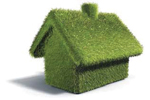 Once only a trend, the "green" movement has become a standard social responsibility. When building your dream home, incorporate these Top 10 elements to ensure that your home and your environment thrive, saving money and the earth.
Once only a trend, the "green" movement has become a standard social responsibility. When building your dream home, incorporate these Top 10 elements to ensure that your home and your environment thrive, saving money and the earth.
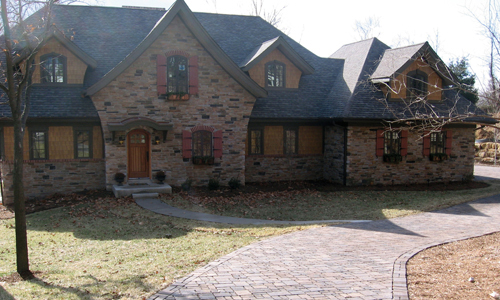
This Near-Zero-Energy Home is St. Louis-based Sage Homebuilders' Showcase design. This cutting-edge home offers nearly every "greener-than-typical" building practice and material and paves the way for the Green Building standard. Photo courtesy of Sage Homebuilders. For more information on Sage and their mission to build green, please visit sagestl.com.
Wouldn't it be great to own a home that was healthier than the average residence? What if it was also extremely energy efficient, reduced pollution, and conserved natural resources? Then you would have what Sage Homebuilders calls a "High Performance Home."
This St. Louis-based company is dedicated to building custom, Green-certified homes. "The green revolution is a very important one; it is creating environmental awareness and encouraging social responsibility," says Seth Teel, Development Analyst for Sage Homebuilders.
By conserving energy and reducing production of materials, green homes help conserve the Earth's natural resources. And with superior insulation and air purification systems, these homes are healthier for the residents. In addition, they save homeowners an abundance of money in utilities and are a more solid investment.
Because the green movement has grown so much, it has become hard to decipher what products are truly green. Sage Homebuilders has made building green a simpler task by calling out the Top 10 elements to incorporate into all new home construction.
1) PEX PLUMBING COMPONENTS:
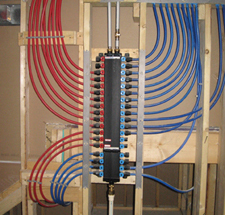
Using a PEX Manabloc? system allows the user to shut off water to each individual hot and cold water line. Photo courtesy of Sage Homebuilders. |
Cross-linked polyethylene (PEX) tubing is used to run hot and cold plumbing lines. It is a viable alternative to PVC or copper materials and aids in the Green movement in a number of ways. First, PEX's flexible nature virtually eliminates the need for elbow joints, drastically reducing piping cost and material use. Also, because of the way PEX is created, it works extremely well under both hot and cold temperatures, resisting chemical attack and creep deformation. Because of this factor, PEX has a lifeline of anywhere from 50 to 200 years.
2) BLOWN-IN CELLULOSE INSULATION:
Cellulose insulation provides a significant advantage over traditional fiberglass insulation panels for a number of reasons. Cellulose insulation is comprised of 80% recycled newsprint and other waste paper products such as cardboard. Utilizing used resources reduces the economic impact of creating insulation. Also, blown-in insulation ensures every cavity will be completely sealed, reducing air filtration in and out, as well as reducing sound transmission. This will drastically cut your energy usage. Another benefit to cellulose insulation is that it does not contain formaldehyde-based binders found in fiberglass, and uses low-toxicity chemical additives to resist fire, insects and mold.
3) FSC CERTIFIED WOOD & BAMBOO:
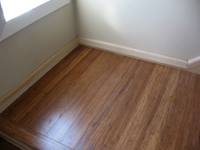
Bamboo flooring provides an exceptional alternative to traditional hardwood and is used in Green-certified homes such as this one created by Sage Homebuilders. |
The Forest Stewardship Council (FSC) is a non-profit organization that encourages the responsible management of forests. It uses a third-party certification program to ensure that building materials and paper products come from "well-managed forests in an environmentally responsible, socially beneficial, and economically viable way." FSC products carry a certification label and can be found at national retailers such as Lowe's. For more information, visit fsc.org. In addition, bamboo, which is technically not a wood but a grass, can be used in place of hardwood for flooring
, countertops, wall coverings, etc. Because bamboo matures fast and regenerates without replanting, it is a rapidly renewable material. It also requires minimal fertilization and pesticides and is extremely hard and durable.
4) LOW / NO VOC PAINTS & WATER-BASED STAINS:
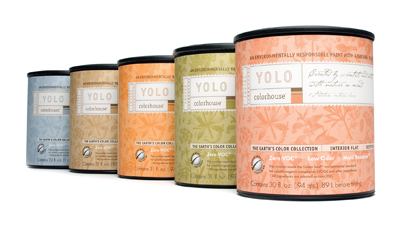
Volatile Organic Compounds (VOCs) are the solvents in paint and stains that evaporate readily at room temperature and give off the smell generally associated with paint products ? which is bad for people and the environment. Even after the paint has dried and the smell has faded, VOCs will continue to release toxins, leading to poor indoor air quality. Many paint companies on the market today are recognizing their social responsibility and creating low- or zero-VOC paints, including Sherwin-Williams and YOLO Colorhouse (www.yolocolorhouse.com). Water-based stains are also available and are a great alternative to the traditional, extremely toxic, stains. They contain low or zero VOCs, go on with ease, and provide a natural finish.
5) ENERGY STAR RATED APPLIANCES:
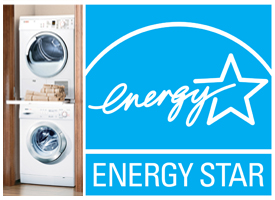
Photo above courtesy of Bosch: All Bosch washers, refrigerators and dishwashers are Energy Star certified. |
ENERGY STAR® is a program through the U.S. Environmental Protection Agency and the U.S. Department of Energy that helps identify and promote energy efficient products and practices. The signifying blue Energy Star label covers more than 50 product categories, including major appliances, home electronics and lighting. These products meet strict energy efficiency guidelines and use substantially less energy for heating, cooling and water delivery. They drastically reduce greenhouse gas emissions, and therefore create less air pollution, protecting the environment. They also save consumers an abundance of money by operating more efficiently, reducing the average yearly utility bill by as much as 30%. Visit energystar.gov for more information.
6) GEOTHERMAL HEATING:
A geothermal heating system uses Earth's ability to store heat in the ground. Just a few feet below the surface, the ground will stay an annual average temperature of 50-70 degrees Fahrenheit depending on the local climate. Using a heat pump, heat is moved from the ground to the house in the winter and then removed from the house and put back into the ground in the summer. This method differs from a conventional furnace by transferring heat rather than producing heat. Geothermal systems are extremely environmentally friendly because they create little to no air pollution and are a renewable energy source. Although these systems do cost 2-3 times more than conventional systems, homeowners will save money in the long run, seeing anywhere from 30-70% annual utility savings. Also, these systems are more durable, require little maintenance and have a longer lifespan than conventional methods.

7) AIR FILTRATION DEVICES:
The EPA estimates that indoor air is more polluted than outdoor air, and that families spend the majority of their time indoors. Because of this, the air filtration device used in your home is central to you and your family's health. Your body has its own filtration device, but many particles in the air, including allergens, are so small they are able to get into your lungs and cause illnesses, especially for allergy and asthma sufferers. In steps your home's filtration device. Many filters for HVAC units on the market today are created to clean these smaller particles from the air, trapping even the tiniest allergens with greater efficiency than the standard 1" thick filters. One such unit is the TRANE CleanEffects? system that claims to remove 99.98% of airborne particles from your home. And not only do these filters offer a healthier home, they also reduce environmental waste because the filters do not need to be discarded and replaced like standard filters do. This, and the payoff for a cleaner indoor air quality, offsets the minimal amount of ozone these filters release into the environment. For more information, please visit toolbase.org and trane.com.
8) TANKLESS WATER HEATERS:
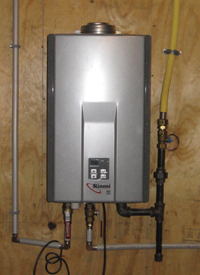
In addition to conserving energy and money, tankless water heaters save up to 90% space versus traditional tank heaters. Photo courtesy of Sage Homebuilders. |
Traditional tank water heaters continuously heat the water they hold, 24 hours every day, whether you're needing hot water or not. This is an abundant waste of energy and money. Tankless water heaters provide a much more efficient option by heating water only as it is needed. The water is heated quickly and delivered at a steady rate for as long as it is needed, and the heater shuts off automatically when the supply is closed. Tankless water heaters are also extremely compact when compared to tank heaters, as they can be wall-mounted whereas tanks can require up to 16 square feet of floor space. Several types and sizes of tankless water heaters are available on the market today. It is essential to find one that will be able to withstand your home's demands, depending on the size of your home and family. "Whole House" types are available, or you can install two or more separate units to handle different appliances if necessary. For more information on the energy savings and usage guidelines, visit tanklesswaterheaterguide.com
9) DUAL-FLUSH TOILETS:

The Aquia™ Dual Flush Toilet from Toto®will significantly reduce the amount of water your home uses. |
American homes are notorious for wasting water. It seems not much thought is given to leaving the water running while brushing your teeth or taking an hour-long shower. However, with the eco-friendly trends of today, our wastefulness is becoming more apparent. One product set to combat this is the dual-flush toilet. These designs look and act like standard toilets but are able to reduce water consumption by providing the right amount of water for the specific task. Clearly, liquids (#1) need less water to flush than solids (#2). Therefore, these toilets incorporate one button for a #1 flush that uses approximately 0.9 gallons of water, and one button for a #2 flush that uses the standard 1.6 gallons of water. Since the majority of bathroom visits are for #1, dual flush toilets can reduce a family's annual water consumption as much as 60%.
10) RECYCLED GLASS COUNTERTOPS:
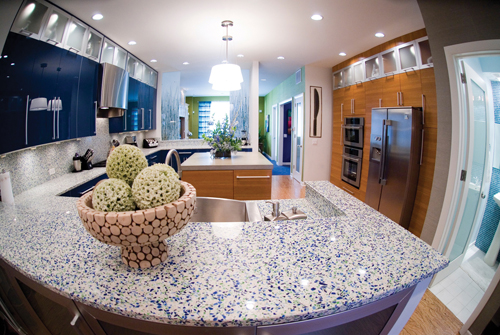
This countertop is made exclusively from recycled glass from EnviroGLAS? and was designed for Extreme Makeover: Home Edition. Photo courtesy of enviroglasproducts.com.
Beautiful, durable and environmentally friendly. What's more to ask for? Several companies committed to a sustainable environment, including IceStone?, EnviroGLAS?, and Vetrazzo?, are producing household necessities made completely of recycled glass. Discarded glass from windshields, bottles, plate windows, etc. are turned into stunning, functional pieces that can be used as flooring, tiling, countertops, backsplashes, vanities, fireplace surrounds, etc. Available in every sparkling color imaginable, using recycled glass countertops has a huge advantage over granite and marble because the material does not need to be quarried, is less porous, highly heat resilient and does not need to be resealed. Also, they generally contain no VOCs. In a green home, it doesn't get much better than incorporating a once wasted consumer product and putting it to a brilliant use again.
Here are some related articles:
Save this article to:
back to top